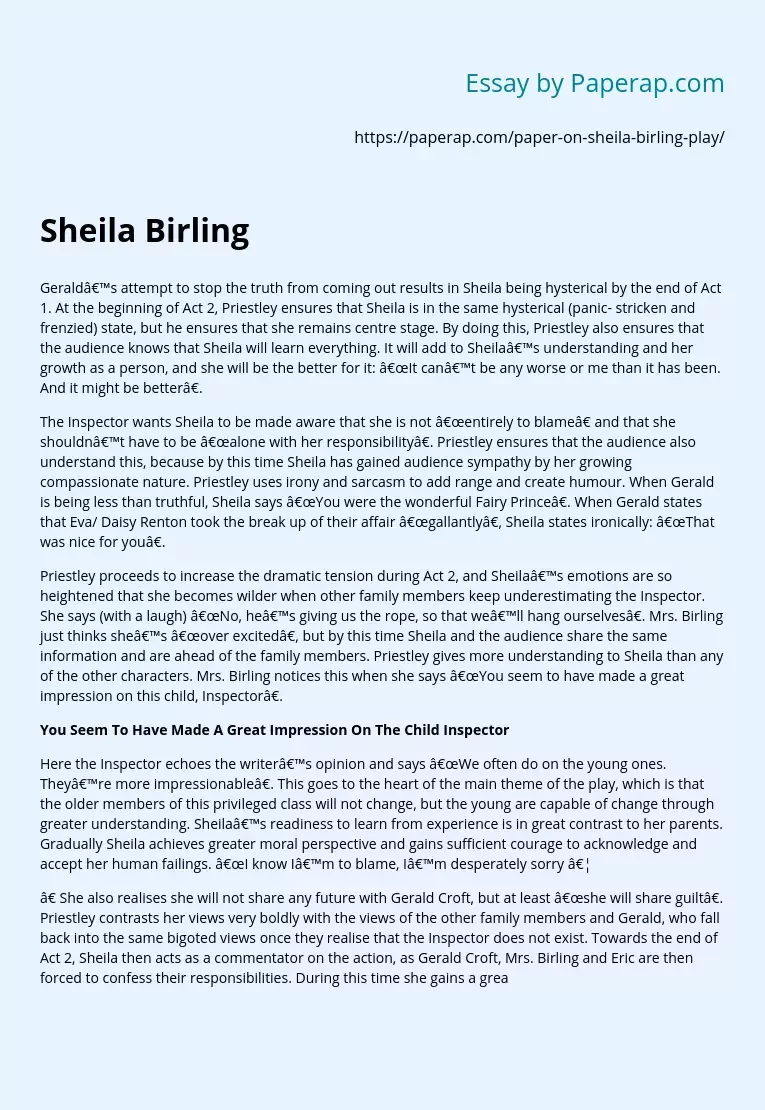Sheila Birling's Play Analysis
Gerald’s attempt to stop the truth from coming out results in Sheila being hysterical by the end of Act 1. At the beginning of Act 2, Priestley ensures that Sheila is in the same hysterical (panic- stricken and frenzied) state, but he ensures that she remains centre stage. By doing this, Priestley also ensures that the audience knows that Sheila will learn everything. It will add to Sheila’s understanding and her growth as a person, and she will be the better for it: “It can’t be any worse or me than it has been.
And it might be better”.
The Inspector wants Sheila to be made aware that she is not “entirely to blame” and that she shouldn’t have to be “alone with her responsibility”. Priestley ensures that the audience also understand this, because by this time Sheila has gained audience sympathy by her growing compassionate nature. Priestley uses irony and sarcasm to add range and create humour. When Gerald is being less than truthful, Sheila says “You were the wonderful Fairy Prince”.
When Gerald states that Eva/ Daisy Renton took the break up of their affair “gallantly”, Sheila states ironically: “That was nice for you”.
Priestley proceeds to increase the dramatic tension during Act 2, and Sheila’s emotions are so heightened that she becomes wilder when other family members keep underestimating the Inspector. She says (with a laugh) “No, he’s giving us the rope, so that we’ll hang ourselves”. Mrs. Birling just thinks she’s “over excited”, but by this time Sheila and the audience share the same information and are ahead of the family members.
Priestley gives more understanding to Sheila than any of the other characters. Mrs. Birling notices this when she says “You seem to have made a great impression on this child, Inspector”.
You Seem To Have Made A Great Impression On The Child Inspector
Here the Inspector echoes the writer’s opinion and says “We often do on the young ones. They’re more impressionable”. This goes to the heart of the main theme of the play, which is that the older members of this privileged class will not change, but the young are capable of change through greater understanding. Sheila’s readiness to learn from experience is in great contrast to her parents. Gradually Sheila achieves greater moral perspective and gains sufficient courage to acknowledge and accept her human failings. “I know I’m to blame, I’m desperately sorry …
” She also realises she will not share any future with Gerald Croft, but at least “she will share guilt”. Priestley contrasts her views very boldly with the views of the other family members and Gerald, who fall back into the same bigoted views once they realise that the Inspector does not exist. Towards the end of Act 2, Sheila then acts as a commentator on the action, as Gerald Croft, Mrs. Birling and Eric are then forced to confess their responsibilities. During this time she gains a great understanding of the situation, therefore becoming the moral backbone of the play.
Frequently Priestley has Sheila summarise the action. For instance, in the central part of Act 2, Sheila has two major speeches which help her and the audience appreciate what is going on. In the first speech she accepts Gerald’s failings with maturity: “I don’t dislike you as I did half an hour ago… I rather respect you more than I’ve ever done before… ” But Sheila has changed, and Priestley ensures that the audience realises this: “… It was my fault that she was so desperate when you (Gerald) first met her… ” The Sheila that we meet at the beginning of the play would not have accepted this.
Sheila realises that she has changed too: “You and I aren’t the same people who sat down to dinner… ” Unfortunately it is only Sheila who goes through such a dramatic transformation. At the beginning of Act 3 Sheila is in tears because she is the only one who realises that not one of the guilty parties can now say “I’m sorry, Eva Smith”. Sheila is reduced to tears when she says quietly: “That’s the worst of it”. She also begins to understand towards the end of the final act that very little changes. She says “bitterly”- I suppose we’re all nice people now”. “So there’s nothing to be sorry for, nothing to learn.
We can go on behaving just as we did”. Priestly shows Sheila to be completely disappointed and disheartened by the others lack of awareness and their unwillingness to change, with the exception of Eric. The author’s high moral position is reflected in Sheila’s words and actions. Sheila states (passionately- Priestley’s stage direction) “You’re pretending everything’s just as it was before”. Sheila’s disappointment is made worse by the others comments. Mrs. Birling states “Well why shouldn’t we? ” (That is, why shouldn’t we carry on as before? ) Sheila’s response to the tragedy is the most positive aspect of the play.
Sheila continues to question the family’s attitudes and their refusal to acknowledge their guilt in the death of Eva Smith. She begins to learn about the importance of society, and her responsibility towards the less fortunate. This is Priestley’s main theme throughout the play, and Sheila is his symbol for it. The audience can leave with this life-enhancing knowledge.
Sheila Birling's Play Analysis. (2019, Dec 05). Retrieved from https://paperap.com/paper-on-sheila-birling-play/

